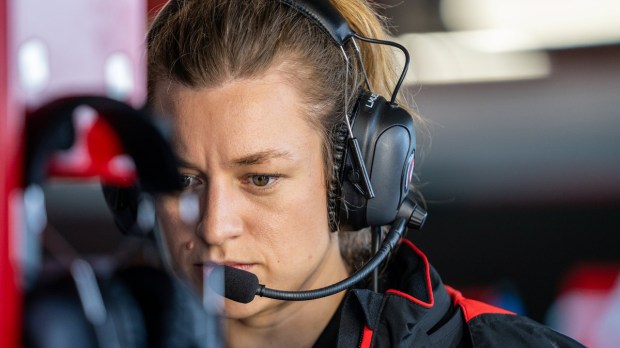Breaking Barriers in Motorsport: The Truth Behind Laura Mueller’s Historic Role as Formula 1’s First Female Race Engineer
In a sport where speed, precision, and engineering excellence are celebrated, Formula 1 (F1) has long been a realm where the spotlight has shone almost exclusively on men. From drivers to engineers, pit crew members to strategists, the roles have historically been dominated by men. However, as society continues to push for inclusivity, diversity, and equal representation in all fields, the motorsport industry is beginning to evolve, slowly but surely.
One remarkable shift that promises to make waves in F1 history is the appointment of Laura Mueller as the first-ever female race engineer in Formula 1. A talented and driven professional, Mueller’s role with the Haas F1 Team marks a significant milestone in the sport’s journey toward greater diversity. Her groundbreaking position involves direct communication with F1 driver Esteban Ocon during races, allowing her to be part of the high-stakes action in real-time. This achievement is not just a triumph for Laura but also for all women who aspire to be part of the motorsport industry.
Let’s explore Mueller’s journey into the world of F1, the significance of her appointment, and how her role may serve as a catalyst for a more inclusive future in motorsport.
1. A New Era in Formula 1: Laura Mueller’s Groundbreaking Role
Formula 1, an arena known for its competitive nature and intense focus on performance, is undoubtedly one of the most male-dominated sports. For decades, women have faced numerous barriers to entry in the industry, from overt sexism to lack of representation and access to resources. However, Laura Mueller’s entry into F1 signifies a refreshing change. She has become the first female race engineer to work directly with a driver on race weekends, a role that involves managing real-time data, developing strategies, and communicating crucial insights to the driver.
Mueller’s new position is not just a technical achievement—it’s a symbol of change. While it may seem like a small step, it sends a clear message that F1 is embracing a future that’s more inclusive, welcoming, and reflective of the diverse talent pool available. With her expertise and passion, Mueller is helping to break down stereotypes about women in motorsport.
In her role at Haas F1, Mueller will be tasked with managing complex data, making split-second decisions, and strategizing on the fly—all while maintaining clear communication with Esteban Ocon. Her work will directly impact Ocon’s performance, providing valuable support during the race. This is a huge responsibility, and it highlights the level of trust and confidence that the team places in her abilities.
2. Overcoming Challenges in a Male-Dominated Industry
Mueller’s success didn’t come easily. She had to work hard to carve out a space for herself in a highly competitive and historically exclusive field. The journey into F1 for women has been an uphill battle, with few role models to follow and fewer opportunities to break through. Yet, Laura’s story is a testament to resilience, talent, and determination.
It’s easy to assume that being a woman in motorsport would be a disadvantage, but Mueller didn’t let that deter her. Instead of focusing on the hurdles, she doubled down on honing her craft, and gaining expertise in areas like data analysis, race strategy, and vehicle performance. Her technical skills, paired with her unwavering dedication, have set her apart in a field that’s notoriously difficult to enter.
As a result of her hard work, Mueller has now become a trailblazer, proving that women can thrive in roles that were once exclusively dominated by men. Her presence in the paddock is a powerful reminder that talent, not gender, should be the determining factor in who gets to participate in motorsport at the highest level.
3. The Role of Diversity in Formula 1’s Future
The appointment of Laura Mueller also speaks volumes about the growing push for diversity within the sport. F1, alongside other motorsports, has faced increasing scrutiny regarding its lack of representation, particularly when it comes to gender diversity.
Over the past few years, efforts have been made to encourage women to pursue careers in motorsport. The FIA’s “Girls on Track” initiative, for instance, aims to provide young girls with the opportunity to engage with motorsport from an early age. Programs like this are helping to cultivate a pipeline of female talent, allowing more women to enter the industry and pursue careers as engineers, strategists, and even drivers.
Mueller’s role at Haas is part of this larger trend, where gender diversity is becoming a more central issue. It’s also important to note that her success is not just a win for women, but for anyone who believes that motorsport should be accessible to all people, regardless of their background, gender, or ethnicity.
As more women join the ranks of engineers, mechanics, and strategists in F1, it opens doors for a wider range of perspectives, ideas, and innovation. In an industry that thrives on technological advancement, the inclusion of diverse voices can lead to more creative solutions and improved performance, benefiting the sport as a whole.
4. Laura Mueller and Her Impact on Future Generations
One of the most significant impacts of Laura Mueller’s achievement will be the inspiration it provides to future generations. For young girls interested in engineering or motorsports, seeing someone like Laura in a high-profile position is both empowering and motivating.
Her success shows that pursuing a career in F1 is not just reserved for men; women too can reach the pinnacle of motorsport if they have the skill, passion, and determination. This message is crucial in breaking down the barriers that have traditionally kept women away from pursuing careers in engineering and motorsports.
Moreover, Laura’s role at Haas also brings greater attention to the importance of women’s representation in the wider motorsport ecosystem. By shining a light on her groundbreaking achievement, the sport is encouraging other women to step up and take their place in the industry.
Ultimately, Mueller’s story could inspire countless young women to follow in her footsteps, fostering an environment where gender diversity becomes the norm rather than the exception.
Laura Mueller’s appointment as Formula 1’s first female race engineer is a monumental moment in motorsport history. Her role with Haas F1 represents more than just a personal achievement; it symbolizes a significant step forward for diversity in a sport that has long been dominated by men. With her talent, skill, and determination, Mueller is breaking down barriers and paving the way for other women to follow suit in the motorsport industry.
Her groundbreaking work proves that passion and talent can transcend gender, and her presence on the F1 team sets the stage for a more inclusive future in motorsport. As we look ahead, it’s clear that Laura Mueller’s story will inspire countless others to chase their dreams, knowing that they too can be a part of this thrilling, fast-paced world.
In the end, motorsport is about excellence, and excellence knows no gender. With Laura Mueller leading the charge, the future of F1 looks brighter, more inclusive, and more innovative than ever before.






















